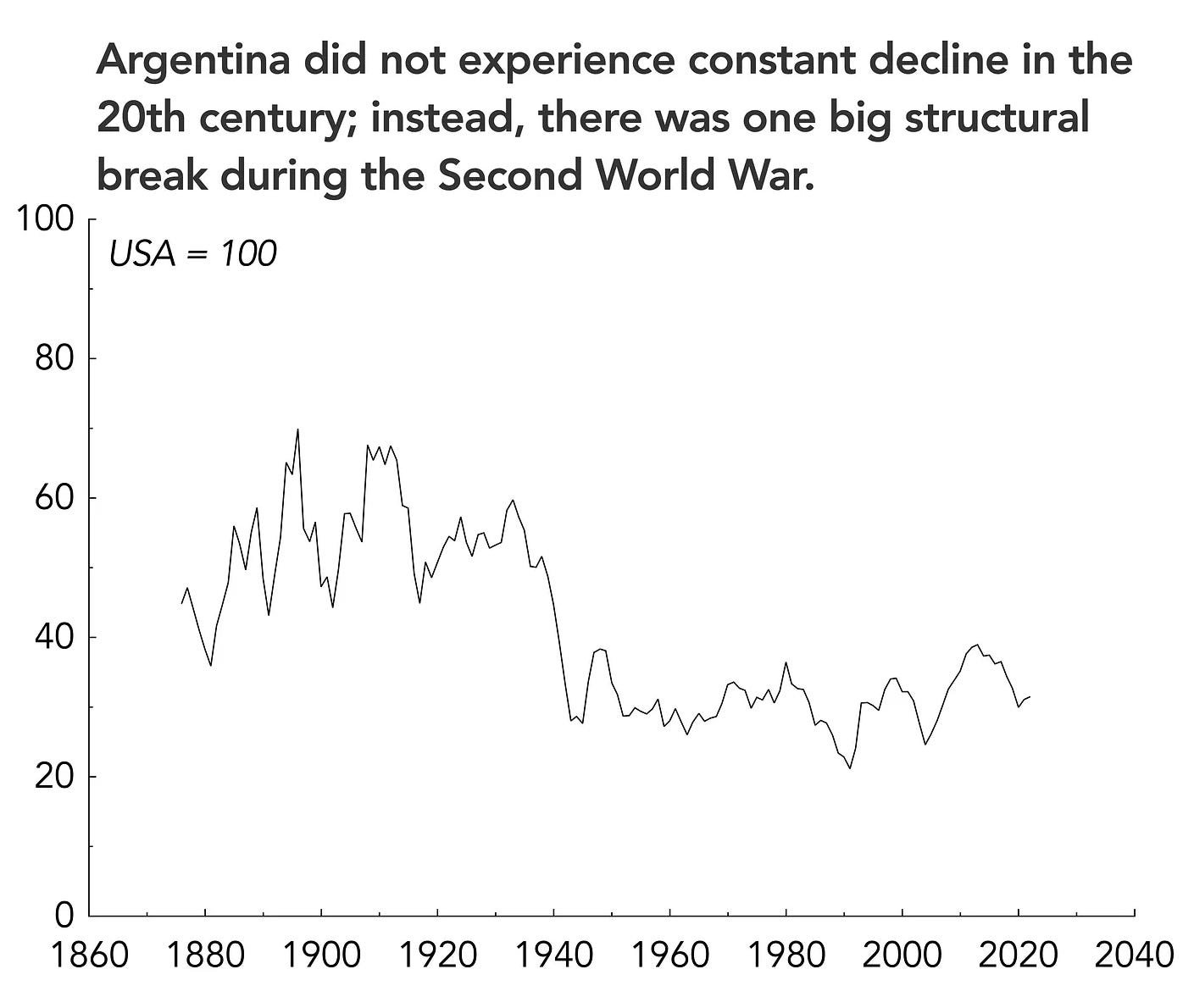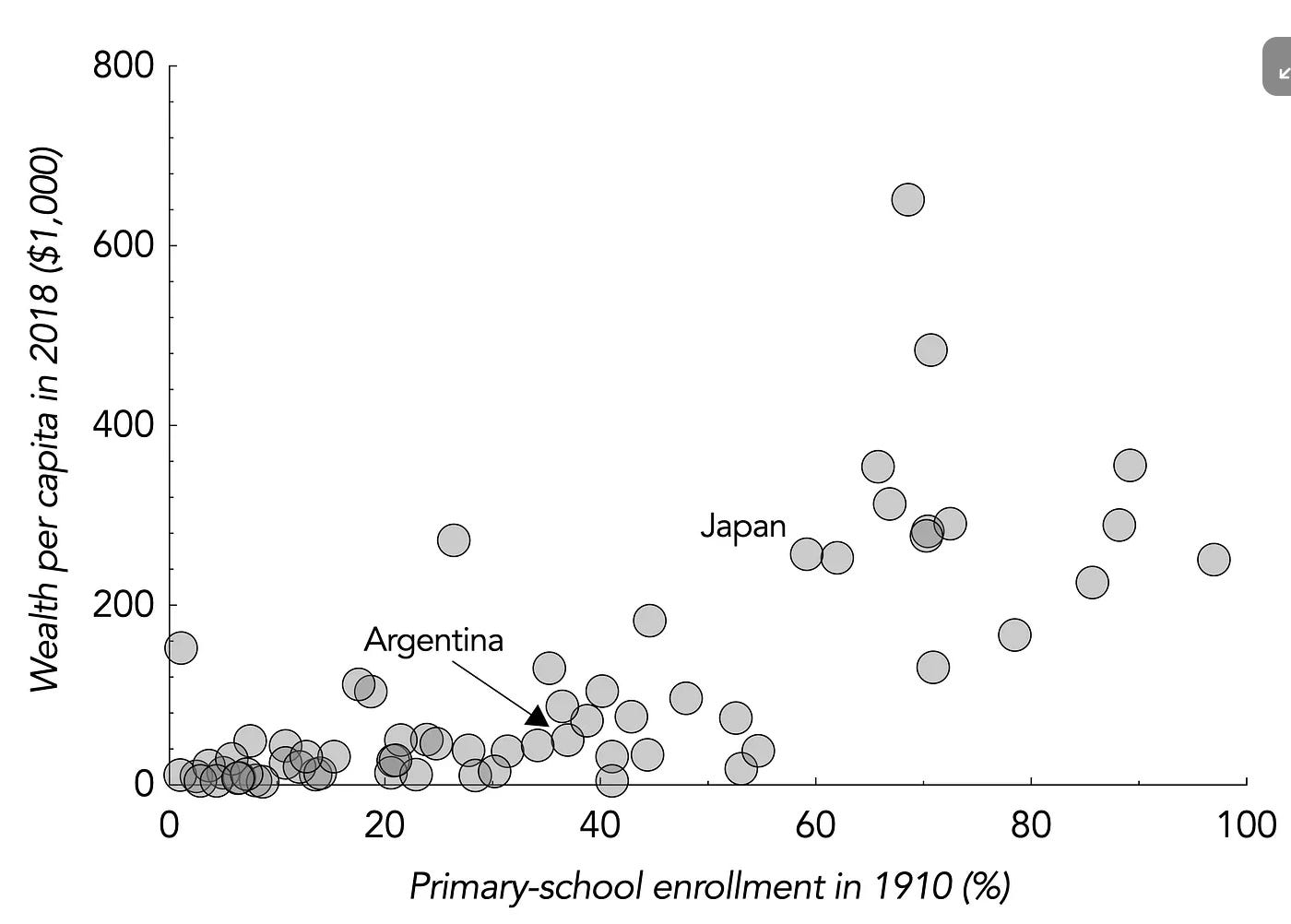BRIEFLY NOTED: For 2024-03-09 Sa
Dismal BREXIT results scorecard; Martin Wolf despairs at broken British economic growth; I may be Chair of UC Berkeley’s Library Committee next year; moral fault attaches to the honchos of the “New Yorker” in employing Susan Glasser; new estimates of Argentina’s long-run economic growth; Meredith Brooks & Queen Latifah; very briefly noted; & Nobody Expected Our Current Interest-Rate Configuration, & BRIEFLY NOTED: For 2024-03-07 Th…
SubStack NOTES:
Economics: Yes, the scorecard from Brexit has now been filled out. More than 1/7 of Britain’s potential exports have vanished. As was predicted. The costs are immense—maybe 4% of national income from the direct channel alone, and there are additional indirect investment-reduction channels not modeled by the OBR or the BoE. It is worth remembering that Brexit was not supposed to pass, but to fail, and in failing simply falsely demonstrate to all the “Little Englanders” that one particular faction of Tory mountebanks was more on “their side” that other factions:
Chris Anstey: Brexit Gloomsayers Were Right, in Warning to US: ‘In the 2016 political battle over whether to take the UK out of the European Union, Brexit supporters dismissed professional economists’ forecasts for significant economic damage if the divorce happened. The results are now clear: The gloomsayers… got it right…. A 15% fall in trade…. A long-term squeeze on the country’s economic potential from Brexit is playing out as feared. There’s been a 4% reduction in the UK economy’s potential productivity compared with if it had stayed in the EU, the OBR found… <https://www.bloomberg.com/news/newsletters/2024-03-07/world-economy-latest-brexit-gloom?cmpid=BBD030724_NEF>
Economics: Martin Wolf cries out in despair. The British electorate and Nick Clegg have together given the British Tories the baton to run the country since 2010. They have run it into the ground—failed to invest in Britain, and broken many of the links to the outside world and some of the domestic systems that boosted and supported prosperity. And now they are about to try to break them again in the hope that offering yet another tax cut to their base will somehow bring them a semi-miraculous victory in the next election. Fortunately for Britain, they probably will not get the chance, and a bunch of less-cynical more-competent leaders who are not actively malevolent will get the chance to try to fix things. What should Keith Starmer’s Labour government do, if things do not continue the dumpster fire of the past decade and a half? Tax, invest in infrastucture, invest in people, invest in systems, and make it as easy as possible for the hard-working and entrepreneurial to move into Britain and for British exports of goods and services to move out of Britain:
Martin Wolf: Britain needs more than fiscal games: ‘The old budgetary theatre will not help improve the dire performance of the UK economy…. In the fourth quarter of last year, real gross domestic product per head was 28 per cent below what it would have been if the 1955-2008 trend had continued…. In all, this is a disaster. The chancellor is right that performance elsewhere has been rather bad, too. But his tendency to fall back on favourable comparisons with the growth of GDP in other large European countries flatters to deceive…. The chancellor has… promise[d] modest tax cuts. The OBR had to grant its imprimatur, because he has made promises of frugality that almost nobody believes will happen, justified in part by promises of higher public sector productivity that are no less implausible…. This, then, is… doubly frivolous.. frivolous relative to the need to transform the… British economy… [and] in its own terms, as a system for ensuring credible fiscal policy… <https://www.ft.com/content/dab5f449-4cfa-4c42-9270-b211f8b5d7fa>
Academia: Really not what one wants to see in one’s email inbox as of a spring lunchtime:
Journamalism: The rot in American journalism runs deep and wide.
The New Yorker gave Susan Glasser the baton thinking she would write about “Sleepy Joe”—old, low-energy, and senile. But did it take her even an hour to switch over to the new Republican message—that there is something wrong with “Shouty Joe”? No:
Tom Levenson: ‘It must run in the family: I read Susan Glasser’s New Yorker SoTU piece. It’s…not good There’s “shouty” Old Joe Biden (who, may I say, is old) taking on “reliable bad guys” while being mean, pardon, “unusually partisan.” She quotes Hannity, no Ds. This is what elite media failure looks like. Glasser is half of the leading political journalist power couple w. her spouse, NYT’s Peter Baker. The piece read as if it were written to a pre-existing frame. Biden’s old; he’s “shouty,” not forceful, & the substance of the speech itself was dismissed as boring stuff that will never happen. And much of it was poorly written and worse thought theater criticism, describing how she (with no reporting or data) thought it landed. Vibes “journalism” throughout, describing a scene very different from the one I watched. Who to believe? A compromised media or my own lyin’ eyes… <https://bsky.app/profile/tomlevenson.bsky.social/post/3kn7sjbvuuc2a>
TWO IMAGES: Joseph Francis Is Making New Estimates of Argentina’s Economic Growth:
ONE VIDEO: Meredith Brooks & Queen Latifah: Lay Down:
Very Briefly Noted:
Economics: Andy Haldane: Britain’s hunt for growth goes on: ‘The chancellor’s fiscal straitjacket meant there were few measures in the Budget likely to help an investment-starved economy…. In serious times, were these serious macroeconomic measures?… Falling paths for deficits and debts sound prudent. But in the investment-starved UK economy, fiscal rules that fail to protect investment damage the economy’s medium-term health and, with it, the public finances. The current fiscal rules are self-defeating on their own terms…. This is the height of fiscal folly…
<https://www.ft.com/content/86d4729b-343a-47e2-8118-3ad83f26ed34>Alexandra Scaggs: US companies are still very profitable: ‘How Goldman Sachs learned to stop worrying and love “greedflation”… <https://www.ft.com/content/6cf2b93a-01fa-4f79-98bb-037ee61eda09>
Diane Coyle: Sharing the Tech Wealth: ‘Big Tech firms flagrantly disregard the implicit social contract that enables capitalist economies to thrive. The time has come to curb their market power and establish the institutional mechanisms necessary to prevent the benefits of technological innovation from being monopolized by a privileged few…. Governments must invest in developing digital public infrastructure. The concept of an open-standards technology stack – consisting of digital identification, a payment system, and a data-exchange platform – has gained traction in economic-development circles in recent years, and such frameworks could also streamline the provision of public goods… <https://www.project-syndicate.org/commentary/digital-public-infrastructure-holds-key-to-shared-prosperity-by-diane-coyle-2024-02>
Anton Shilov: Nvidia becomes world’s 4th most valuable company, surpasses Alphabet and Amazon: ‘AI frenzy lifts market cap of Nvidia, Microsoft, TSMC, others…. TSMC became the world’s 10th most valuable company…. High demand for Nvidia’s AI GPUs, such as A100 and H100. The appetite for these processors, which are essential for AI datacenters, is insatiable and Nvidia can barely meet it… <https://www.tomshardware.com/tech-industry/nvidia-becomes-worlds-4th-most-valuable-company-surpasses-alphabet-and-amazon?lrh=3625f5d5d88fda4c86f1b12a163235e9184ddff23bb96415bada1914b2593f53>
Bryce Elder: “Sell Nvidia”: ‘Sanctions risks, self-funded demand, customers becoming competitors . . . . Just don’t tell the shareholders…. It looks like a bearish note from a bulge-bracket bank on Nvidia, the world’s most overbooked hedge fund hotel. That kind of thing just doesn’t happen. Of the 64 research houses to publish on Nvidia shares, 58 rate the stock a “buy”. It’s been nine months since a shop other than Morningstar published a sell note. And we should be clear that Barclays’ equities analysts are still enthusiastic on Nvidia, last week reiterating a $650-per-share target price. The screenshot above is credit research. It’s from Sandeep Gupta, a 14-year TMT veteran on the bank’s fixed-income side. Gupta’s main thesis is straightforward. Competition for generative AI hardware is catching up, end-user deployments don’t need much power once the database is built, there’s a shakeout due soon, and Nvidia’s estimated 98 per cent market share of data-centre GPUs probably won’t last: “AI chip demand will eventually normalize once the initial training build has been completed…. Inference… require[s] less computing power than the training phase. High-powered PCs and phones could be capable enough…. The cost of building Large Language Models… and limited monetization opportunities could eventually force the exit of smaller (but still meaningful) customers of Nvidia from the AI market, helping to ease GPU supply constraints…”. Just five customers provided 46 per cent of Nvidia’s revenue last quarter, with Microsoft and Meta alone accounting for 28 per cent of the total… <https://www.ft.com/content/e1beb7a5-6c91-4d7f-bc90-79689774881d>
Economic History: Joseph Francis: The argument in a nutshell: ‘This is how I currently see the argument of my book on Argentina…. Argentina became a wealthy country through its integration into the world market. Government policy aided growth by giving immigrants relatively easy access to the land that was being brought into production in the Pampean region. The Interior’s mestizo peasants were, however, largely excluded from the boom because they were needed to work on vineyards and sugar plantations. Land policies that discriminated against them were justified by the ruling class’ racism…. The terms-of-trade boom ended with the First World War, and Argentina thereafter declined in relative terms…. The small size of the domestic market limited economies of scale in industry…. Both Argentina and Australia tended, moreover, to underinvest in education due to a mentality of being “lucky countries”… land abundance…. Democratisation had been limited due to the exclusion of the Interior’s mestizo population…. Politics then became highly conflictual once the terms-of-trade boom ended. The ruling class… appealing to a mythical golden age… [of] laissez faire. Populists… funded their social programmes through inflation…. Populism contributed to relative decline, but the (neo)liberal reforms of the populists’ opponents often did as well…
Karl Kautsky: The Dictatorship of the Proletariat: ‘The absolute rule of bureaucracy… leads to arbitrariness and stultification…. It is, then, urgently necessary for the executive to be subjected to public criticism…. The control of the Government is the most important duty of Parliament, and in this it can be replaced by no other institution…. Dictatorship… literally… signifies the suspension of democracy… [and] the sovereignty of a single person…. Did not the Reign of Terror of the proletariat and lower middle-class of Paris… bring with it enormous consequences of the highest historical significance? Of course. But of what kind were they?… To have victoriously beaten off… attack was the historical achievement of the Reign of Terror. Thereby is again proved distinctly the old truth, that dictatorship is better able to wage war than democracy. It proves in no way that dictatorship is the method of the proletariat to carry through social transformations… <https://archive.org/details/cu31924028351439/page/n8/mode/1up?view=theater>
Ian Angus: The origin of Rosa Luxemburg’s slogan “socialism or barbarism”: ‘The author of the sentence Luxemburg quotes, and of the “socialism or barbarism” concept more generally, was not Engels, but the man who was widely viewed as the most authoritative Marxist theoretician after Marx and Engels—Karl Kautsky…. Das Erfurter Programm in seinem grundsätzlichen Teil erläutert…. “As things stand today capitalist civilization cannot continue; we must either move forward into socialism or fall back into barbarism”… <https://climateandcapitalism.com/2014/10/22/origin-rosa-luxemburgs-slogan-socialism-barbarism/>
Neofascism: Phil Christman: Interview with John Ganz: ‘About 1992, archival digging, whether the Right is beatable, “the ditziness of the high WASP,” the joy of minor artistry, etc…. I have looked forward to John Ganz’s When the Clock Broke: Con Men, Conspiracists, and How America Cracked Up in the Early 1990s for years now, and it does not remotely disappoint. He can recapture the texture of a forgotten historical moment, he can render lucid and thoughtful judgments efficiently without cluttering the movement of the narrative, and he can do it in rich, economical paragraphs…
Journamalism: Jamison Foser: ‘This New York Times article never—not once—mentions that in the poll to which it refers, a majority of Americans think Trump has committed serious crimes. 53% say he has; only 36% say he hasn’t. The Times doesn’t mention that. This is simply not honest journalism.




